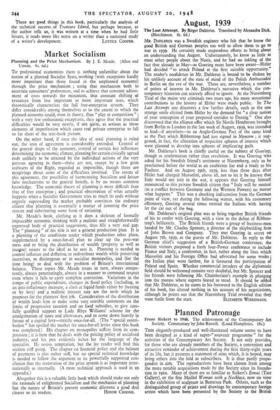Market Socialism
To professional economists there is nothing unfamiliar about the notion of a planned Socialist State, working (with exceptions hardly more important than those found in the unplanned economy) through the price mechanism ; using that mechanism both to ascertain consumers' preferences, and to achieve that constant adjust- ment of QOM towards the minimum, that constant shifting of resources from less important to more important uses, which theoretically characterises the full free-enterprise system. They differ considerably among themselves as to the extent to which the planned economy could, even in theory, thus "play at competition " ; with a very few enthusiastic exceptions, they agree that the practical difficulties would be very nearly, if not quite, as serious as those elements of imperfection which cause real private enterprise to fall so far short of the text-book picture.
On the other hand, if once the idea of total planning is ruled out, the area of agreement is considerably extended. Control of the general shape of the economy, control of certain key influences determining the economic climate, planning for certain civically agreed ends unlikely to be attained by the individual actions of the very persons agreeing to them—these are not, except by a few grim stalwarts of the Right, regarded as impossible, though there are misgivings about some of the difficulties involved. The extent of this agreement, the possibility of harmonising Socialism and laisser faire mechanisms to the general benefit, is by no means common knowledge. The economic theory of planning is more difficult than that of free enterprise ; and practical observation of what actually happens when a Socialist Government tries to reach its ends without entirely superseding the market probably convinces the ordinary citizen that planning is essentially a matter of jamming the price system and substituting some form of rationing.
Mr. Meade's book, clothing as it does a skeleton of formally impeccable economic thinking with a realistic and straightforwardly expressed body of practical suggestions, thus fills a very real gap. The " planning " of his title is not a general production plan. It is a planning of the conditions under which production takes place, supplemented by a once-for-all plan to clear up the post-war mess and to bring the distribution of wealth (property as well as incq,me) nearer to the ideal as he sees it. Planning is needed to control inflation and deflation, to redistribute wealth while preserving incentives, to disintegrate or to socialise monopolies, and (for the time being) to deal with the problem of Britain's international balance. These topics Mr. Meade treats in turn, always compe- tently, always penetratingly, always in a manner to command respect even where it fails to carry complete conviction. Variations in the tempo of public expenditure, changes in fiscal policy (including, as an anti-inflationary measure, a slash at liquid funds either by freezing or by levy) and a realistic interest rate are the tools which he proposes for the planners first job. Consideration of the distribution of wealth leads him to make some very sensible comments on the limits of progressive taxation and on food subsidies, to give care- fully qualified support to Lady Rhys Williams' scheme for the amalgamation of taxes and allowances, and to come down heavily in favour of a capital levy—strictly once-for-all. (The "special contri- bution" has spoiled the market for once-for-all levies since this book was completed.) His chapter on monopolies suffers from its com- pression; it is here that he deals with the pricing policy of socialised industry, and his pen evidently itches for the language of the specialist. He resists temptation, but the lay reader will find this section stiff going. The chapter on finahcial policy and the balance of payments is also rather stiff, but no special technical knowledge is needed to follow the argument to its powerfully supported con- clusion that the restoration of the price system is as important inter- nationally as internally. (A more technical approach is used in an appendix.) Altogether this is a valuable little book which should make not only the rationale of enlightened Socialism and the mechanics of planning but the nature of Britain's present economic dilemma a good deal


































 Previous page
Previous page